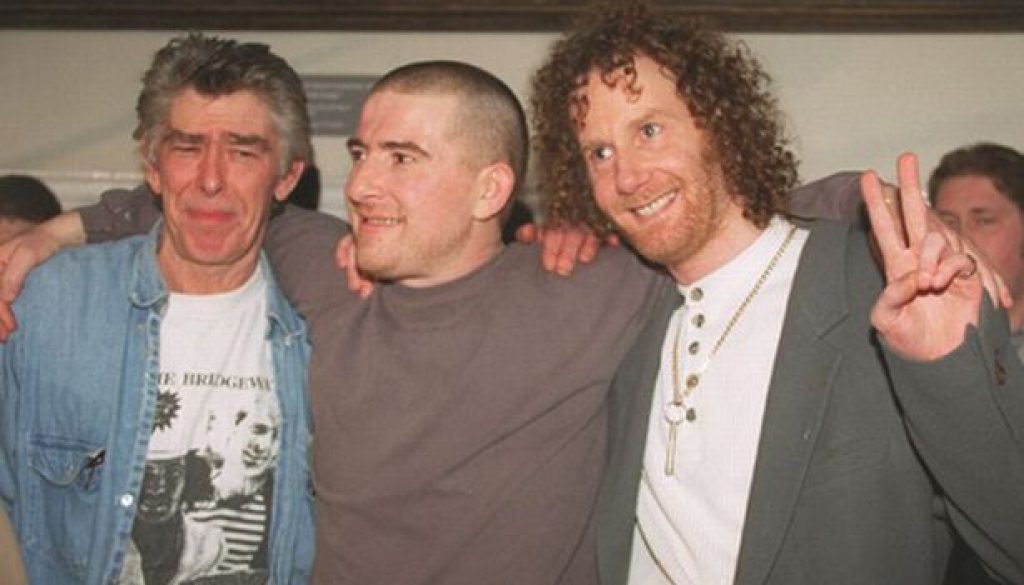On This Day 1997
On this day, 21 February 1997, the “Bridgewater 3” were released after almost two decades of imprisonment.
The Bridgewater 4 were four men wrongfully convicted of the murder of 13-year-old paperboy Carl Bridgewater, who was shot and killed near Stourbridge, West Midlands, in 1978. All four men protested their innocence.
The three surviving men of the Bridgewater 4 had all convictions quashed once and for all in July 1997. Patrick Molloy (aged 51) received a 12-year prison sentence on a manslaughter charge, but died of a heart attack in prison two years into his sentence.
In December 1998 the Crown Prosecution Service decided not to prosecute four former police officers involved in the investigation, due to lack of evidence.
Nobody has since been convicted of Carl Bridgewater’s murder.
We reproduce below an article from the Independent online, 21 February 1997:
The three men jailed for the murder of the newspaper-boy Carl Bridgewater are set to walk free today, bringing to an end a 19-year campaign by their families and supporters.
In a hastily convened hearing at the Court of Appeal in London, three appeal judges are expected to declare the convic- tions unsafe, or to grant the men bail pending a final ruling, following a sudden decision by the Crown Prosecution Service that it will not contest the men’s appeal hearing, originally set for April.
The judge in the original murder trial, Sir Maurice Drake, told BBC’s Newsnight: “It is deplorable that justice has been perverted on bent police evidence.
“No-one has ever alleged that the original trial was conducted unfairly or that the summing up was in any way inaccurate. Irrespective of how strong the other evidence may have been it has been found that the police misbehaved.”
The men have always insisted that they were innocent of the killing of the 13-year-old boy, who was shot in the head in 1978 as he stumbled across a burglary at an isolated farmhouse, Yew Tree Farm, near Stourbridge, West Midlands. The decision will put the case alongside those of the Guildford Four, the Birmingham Six and Stefan Kiszko as one of the most serious miscarriages of justice in British legal history.
Michael Hickey, 34, and Vincent Hickey, 42, who were cousins, James Robinson, 62, and Patrick Molloy were convicted in February 1979 largely on a confession by Molloy, who was convicted of the lesser charge of manslaughter. He continued to insist on his innocence, claiming the admission had been beaten out of him, until his death in 1981.
The three remained in prison despite eight separate police inquiries and a lengthy appeal in 1988-89. But the campaign to prove their innocence, led by Ann Whelan, the mother of Michael Hickey, never wavered. But Vincent Hickey’s brother, Alan, said: “When the initial euphoria calms down then it is time to sit down and look back. Then the anger does come in. It’s always called new evidence but it has always been there.”
Ann Whelan said: “It’s all been worth it. They haven’t got justice. They’ve got their freedom but not justice.”
Paul Foot, a journalist, took up the case in 1980, publishing the book Murder at the Farm: Who Killed Carl Bridgewater? in 1986. He said Lord Justice Russell, who presided over the unsuccessful 1988 appeal, “should consider resigning tonight”. The men’s solicitor, Jim Nichol, said last night that there was “powerful fresh evidence of a false confession”.
An appeal hearing was set for 8 April, after Michael Howard, the Home Secretary, agreed to refer the case back for a second time to the Court of Appeal on 26 July last year.
Mr Nichol said a false confession shown to Molloy and alleged to be written by Vincent Hickey was a “lying confession shown to him to make him confess. I am delighted but angry that they have spent 18-and-a-half years in prison for a crime they did not commit. I fully expect my clients to walk out of court tomorrow free men”.
Mr Nichol said the false confession was discovered using scientific ESDA tests.
Two former jurors have publicly distanced themselves from the guilty verdicts. Tim O’Malley, an accountant from Stone, Staffordshire, who was the jury foreman, said last night that the Molloy confession was a “total fabrication … the cement which held the ragbag of evidence together. And forensic evidence in their favour was with- held from us. It is a disgrace”.
It was understood the men had all been moved to Brixton last night to spend what could be their final night behind bars. Once cleared, they can be expected to receive up compensation up to pounds 200,000 each.
Following the unsuccessful 1988-89 appeal the case was revived following the disbandment of the West Midlands Serious Crimes Squad, whose members included the detective, John Perkins, who took the crucial Molloy confession.
But in 1993, the then Home Secretary, Kenneth Clarke, refused to refer the case back for a second time.
The original article can be read HERE.

![16[2]](https://mojoscotland.org/wp-content/uploads/2024/06/162-1024x768-394x330.jpg)

